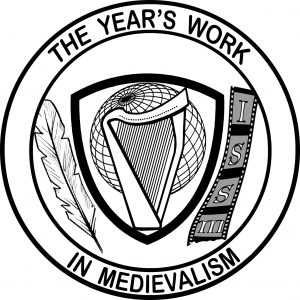Valerie B. Johnson & Renée Ward
John Lennon famously wrote, “Life is what happens to you / While you’re busy making other plans.”1 Indeed, his lyrics have been our mantra since the last volume (and Renée has just noticed that song lyrics are becoming a pattern in these introductions!). Our lives have been extraordinarily busy, as we’re sure yours have been, too. COVID-19 isn’t gone, but the emergency has eased—and, like the world, we’re getting there. Slowly. And that means, yes, we’ve been catching-up with all things Year’s Work in Medievalism.
The current double issue includes materials produced during those lockdown years of 2020 and 2021. We start with a small cluster focused on approaches to teaching during the pandemic. These might seem like old hat now for some readers, but they remind us of the value of face-to-face instruction, how much effort effective online pedagogy requires, and what we might think of as “slow teaching,” regardless of format or delivery method. For those whose institutions have begun to explore online and asynchronous teaching, which is often more accessible to students who cannot learn in traditional settings or conditions, these pieces offer pragmatic advice and pathways to ethical remote instruction. In a world that seems determined to perpetuate all of the digital tools to which we recently and so rapidly “adapted” (under duress, and without due consideration), these pieces offer a refreshing taking-stock of our profession, and they reinforce pedagogical practices that remain important in the post-pandemic world.
The issue then turns to form and media, considering the exaggerated violence of many film and television medievalisms. Streaming services surged in popularity during the pandemic and have become an inspiration-lifeline for medievalism research. The availability of series like Warrior Nun and Buffy the Vampire Slayer offers us insights into intriguing connections between the two franchises, drawing on shared notions of feminism and on-screen dismemberment to examine how dynamic visual medievalisms tell stories. The discussion shifts to studies exploring the effects of medievalism upon creators and scholars, ranging from examinations of ableism in narratives of history-making and how our thinking about disability influences our understanding of historical figures like Richard III, to the stories and adaptation choices creators make when crafting 20th century comic books and 21st century graphic novels. We conclude the discussion with a diptych of articles examining elements of the Harry Potter franchise, drawing on themes of embodiment, violence, and story-telling prevalent in so many works of medievalism and medievalism scholarship.
We close the volume with a piece by the late Alicia McKenzie (January 20, 1976 – April 22, 2022), who delivered this paper at the International Society for the Study of Medievalism’s 36th Annual Conference on Medievalism, organized by Michael Evans and hosted remotely by Delta College (USA) in November 2021. Our thanks to Allie Schreibman, who provided a copy of the talk. Alicia was not a stranger to the ISSM or to YWiM. In Volume 33, we included her article “‘Patchwork Worlds’: History and World-Building in Dragon Age: Inquisition,” which was based on her presentation of the same name at the 2018 ISSM conference at Brock University (CAN). Alicia was one of the most dedicated and ambitious teachers and medievalismists to have graced the classrooms of any institution. It seems fitting, then, to start the volume with a focus on pedagogy and the pandemic and to close it with a piece by someone so devoted to teaching. In fact, Alicia’s love of teaching and of her students is what drew her to medievalism. During her time at Wilfrid Laurier University (CAN), she developed and taught courses on: medieval re-enactment; George R. R. Martin’s Game of Thrones; medievalism in video games; medievalism and the digital environment; medievalism in science fiction; and representations of Vikings in gaming. Her death left a hole in the lives of those who knew her: students, colleagues, friends, and family. Here at YWiM, we feel Alicia’s loss keenly. She is and will continue to be missed.
As always, be well.
VBJ & RW
2023



